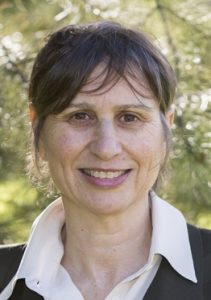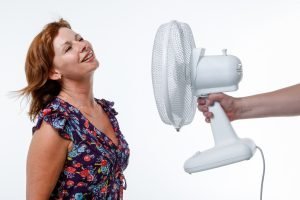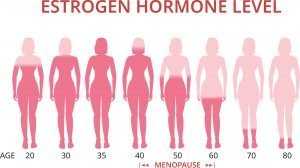Approaching the end of my reproductive years, I like to think menopause will simply mean the end of my periods and with it, the end of the monthly lottery of cramps, mood changes and/or feeling a little less than human.
Then I hear stories about women who go through menopause and experience an entirely new suite of disturbing symptoms – hot flushes, sweats, weight gain, sleeplessness and a general intolerance towards everyone around them.
I can’t help but feel like I’m about to jump from the frying pan into the fire.

Professor Susan Davis is an endocrinologist specialising in women’s health.
So, what can I expect at menopause? How common are these symptoms and how long do they last? And please let there be something I can do about it!
To find out more, I met with Professor Susan Davis, an Australian endocrinologist specialising in women’s health at the Alfred Hospital in Melbourne. Professor Davis is a National Health and Medical Research Council (NHMRC) Senior Principal Research Fellow exploring how women’s hormones change over time and their effect on health. She is also President of the International Menopause Society. Here is what I learned.
When does menopause happen?
Menopause occurs when your periods stop forever. In Australia, the average age of menopause is 51 years, but it can happen earlier or later – it is slightly different for everyone. Like getting your first period, there is no way of knowing reliably when menopause will happen for you.
For most women, menopause occurs naturally, but it can also be caused by having your ovaries removed (surgical menopause) or following chemotherapy or radiotherapy to the pelvis. For a small portion of women (less than 1 in 100), menopause occurs before the age of 40. This is called premature ovarian failure and the reason this happens is not fully understood.
Are there symptoms that tell you menopause is approaching?
Many women experience some symptoms of menopause for up to 10 years before their periods actually stop, and symptoms can continue for some years later. The most common symptom is changes in the menstrual cycle, which can become more or less frequent, or heavier or lighter than usual. Menopause has been reached when a woman has had no period for 12 consecutive months.
What other symptoms are associated with menopause and how long do they last?

Menopause affects women in different ways. For some, there are no or very mild signs, while others experience more serious symptoms that can persist for 5 to 10 years. Unfortunately, it is impossible to tell how long symptoms will last.
The most common symptoms include hot flushes and sweats. These usually don’t start until after menopause and affect women differently. Some women have hot flushes at night, while others experience them during the day. They can be very mild and not too bothersome, or more severe and disturb sleep and quality of life.
Other physical symptoms include aches and pain in the joints, sleep disturbances, and changes in bladder function, like needing to urinate more frequently. Some women also experience vaginal dryness, which can cause general discomfort and/or pain during sex.
Some women experience increased anxiety levels or changes in mood, such as feeling teary or getting upset, irritable or angry more easily than usual.
While this array of symptoms sounds disturbing, many women find they can manage without treatment. But, if symptoms get difficult to handle, there are a number of options available that can help reverse symptoms and vastly improve quality of life.

What treatments are available?
Because the symptoms of menopause are caused by a dramatic fall in the level of the hormone estrogen, the most effective way to combat this is to replace estrogen using hormone therapy.
Hormone therapy contains estradiol, which is the form of estrogen that the ovaries produce during regular menstrual cycles. It can be taken as a tablet, a patch or gel applied to the skin, or as a tiny pellet inserted under the skin. It can also be administered in the vagina for resolving the symptom of vaginal dryness.
A number of different types of hormone therapy are available, which can include estrogen only, or estrogen combined with other hormones. Your doctor will be able to advise the type of hormone therapy and the dose that is right for you, based on your individual circumstances.
Non-hormonal treatments
While hormone therapy is considered the best way to treat symptoms of menopause, they are not appropriate for everyone, particularly those women with or at risk of hormone-dependent cancer. Alternatives to hormone therapy include lifestyle changes (e.g. layering clothing to remove as needed, packing water and a fan in your bag), dietary changes (e.g. avoiding caffeine, hot spicy food and alcohol) and other non-hormonal medications that can target individual symptoms. These can be discussed with your doctor as they need to be prescribed with consideration of your other medications and health conditions.
There is mixed evidence that yoga, acupuncture and hypnosis can help reduce symptoms.
There is no good evidence supporting the use of other bio-identical hormone therapies or complementary medications, such as soy or plant-based estrogens, wild yam cream, black cohosh or dong quai. Further, these are not regulated products, so concerns exist about regulation, standardised dosing, quality and safety. For these reasons, medical experts warn against the use of bio-identical hormone or alternative therapies.
Where to go for more information?
Not many women give menopause a second thought until it is upon them. By understanding what to expect and knowing that symptoms can be managed, entering the years towards menopause is far less of a concern.
If symptoms of menopause are interrupting your life, it is a good idea to see your doctor (GP) or specialist. They will help find the best lifestyle and treatment options that work for you.
The International Menopause Society has produced a number of short videos available on YouTube. These have been developed by clinical experts and world-leading researchers and provide clear and current information about menopause and its treatments. They are available HERE in English and Vietnamese.
Expert Review
The medical content of this page has been reviewed by Professor Susan Davis, a specialist in women’s health at the Alfred Hospital, Melbourne and a NHMRC Senior Principal Research Fellow at Monash. She is president of the International Menopause Society and a member of the Endocrine Society of Australia.







